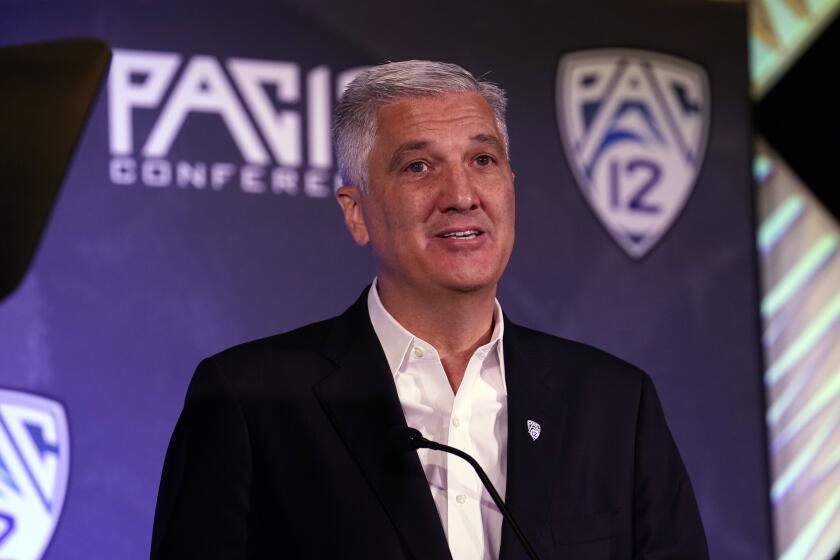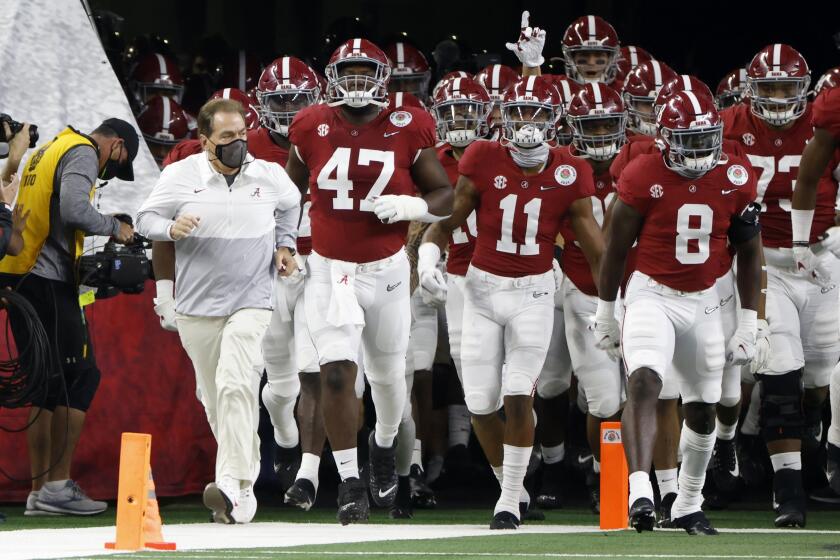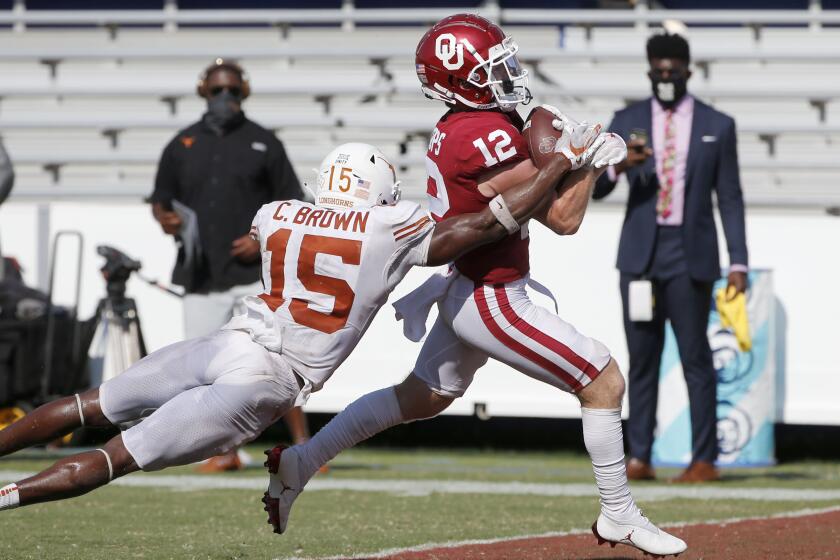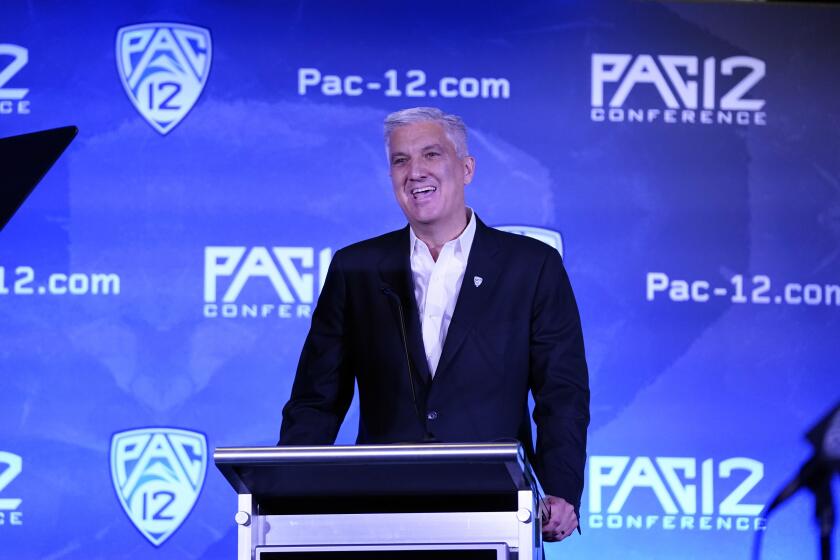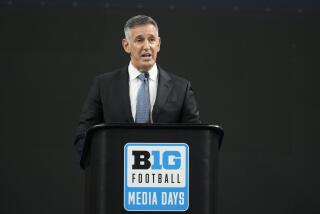Conference realignment roundtable: Will the Pac-12 and Big 12 really merge?
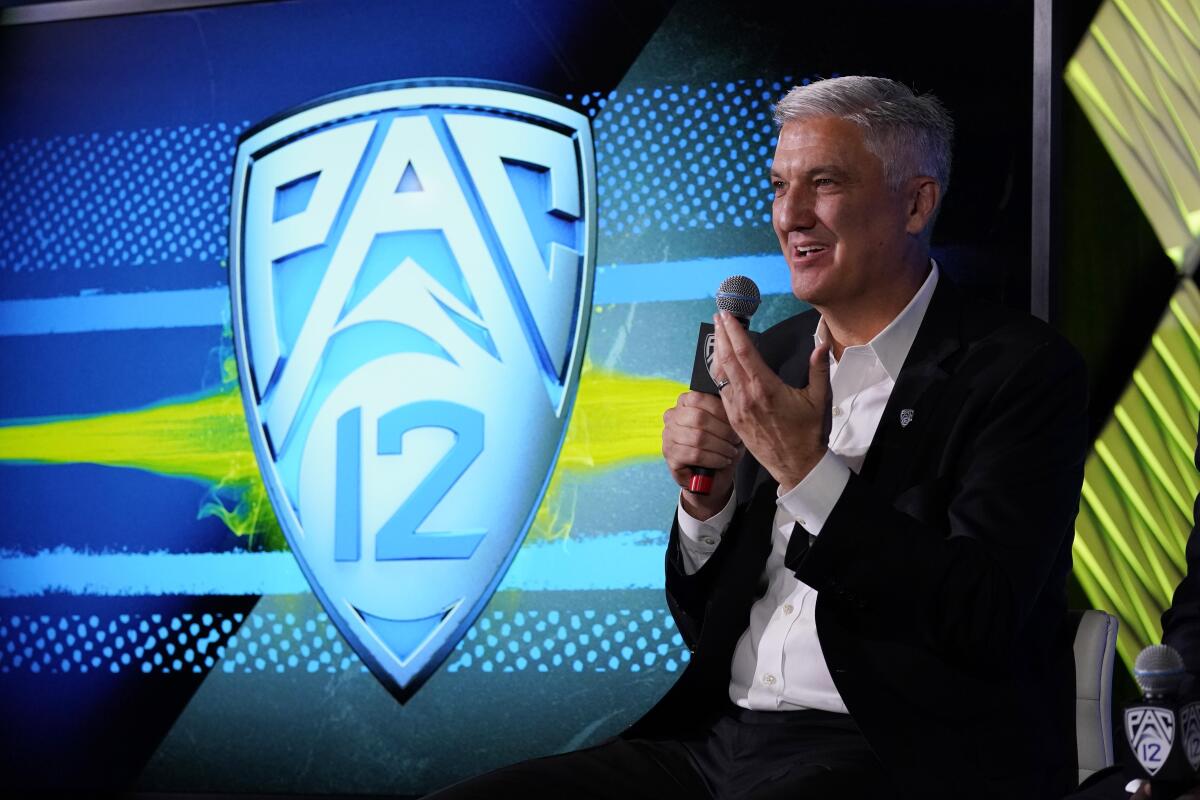
- Share via
The Pac-12 and Big 12 commissioners have met to discuss future partnership opportunities.
What does this mean exactly? Will we see a full-blown merger down the road? Will the two conferences potentially enter TV contract discussions as a group? Will any sort of alliance make the Pac-12 and Big 12 competitively stronger?
Times national college writer J. Brady McCollough and USC reporter Ryan Kartje share what their sources are saying Pac-12 fans can expect as conference realignment reshapes the college football landscape.
With a history of innovation and elite problem-solving skills, commissioner George Kliavkoff says it will be fun helping the Pac-12 navigate massive changes.
McCollough: The first thing we should do before going down the rabbit hole of analyzing what a Pac-12/Big 12 collaboration could look like is understand where this news came from. Max Olson, a national college football reporter with the Athletic, has his reporting roots in Big 12 country. When I saw his report, it made perfect sense that the leak revealing the meeting between Big 12 commissioner Bob Bowlsby and Pac-12 commissioner George Kliavkoff was from the Big 12, which desperately needs to show the remaining eight schools that there could be some hope of salvaging the league.
My sources tell me they met for six hours, but from the Pac-12 end of things, I would not overreact. Kliavkoff is going to be taking lots of meetings in the coming weeks as the landscape shifts in the Texas-and-Oklahoma-to-SEC aftermath. The quote he tweeted later — “One of the most sincere forms of respect is actually listening to what another has to say” — appears pointed. He was there to listen.
The Big 12 would obviously jump at anything the Pac-12 is willing to entertain: a scheduling alliance setting up annual matchups in nonconference play or an actual merger. That all sounds dreamy to the Big 12, which is facing an existential threat. But for the Pac-12, my instinct is that a move like this with a league that’s on its deathbed would be a last resort after all other options to improve the league’s stature heading into 2024 media rights negotiations have been exhausted.
Also, if the Pac-12 has interest in the Big 12 for recruiting/time zone reasons, why wouldn’t it just poach a few of the schools?
Kartje: Let me first just acknowledge that I fully support our new commissioner’s cryptic sub-tweeting. Please, George, do continue throughout this conference realignment saga.
What he shouldn’t do is raid the Big 12 for a collection of schools that add nothing to the Pac-12 outside of a new time zone. Adding middling programs indiscriminately, without heavily scrutinizing the kind of revenue they bring, is exactly the type of panic move the Pac-12 should try to avoid.
Which of the eight left-behind Big 12 schools is even the most desirable for the Pac-12? Texas Tech? Oklahoma State? Neither of those programs would bring much new to the equation, and this conference desperately needs to find a way to close the revenue gap first. If that means adding schools that actually carry their weight in that regard, great. But I don’t see any options in the Big 12 footprint. It seems that most of the conference’s decision makers understand that.
Now, are there other ways for the Pac-12 and Big 12 to work together? Sure. A scheduling partnership only helps both sides beef up their nonconference schedule and makes future media rights negotiations more attractive. But if you’re Kliavkoff, wouldn’t you rather strike that agreement with a more desirable conference that spreads across two time zones, sits on fertile recruiting ground and has a much better reputation for football?
Oh, hello, Big Ten.
With the SEC poised to add Texas and Oklahoma, four Los Angeles Times writers gathered to draft four, 16-team super conferences. The selections and snubs may surprise you.
McCollough: Ryan, prepare for your Inbox to fill with the same Oklahoma State fans who have been writing me the last few weeks after my initial column on this matter. Guns up, buddy. I will take up for the Big 12 a bit and counter that as far as fertile recruiting ground, Texas far trumps the schools in the Big Ten footprint.
You hit the nail on the head, though, about the Big Ten. Kliavkoff would have to engage Big Ten Commissioner Kevin Warren about a scheduling alliance that with USC, Oregon, Washington, Stanford, etc., matching up with Ohio State, Michigan, Penn State, Wisconsin, etc., would create a bidding frenzy from the TV networks and infuse each league with riches.
Of the non-SEC conferences, the Big Ten holds the cards and may feel it doesn’t need to hitch its wagon to the Pac-12 — similar to how the Pac-12 should feel about the Big 12. The only disaster scenario for the Pac-12 is that the Big Ten decides to pillage in response to the SEC, and the Pac-12 has the most attractive properties.
Ryan, you’re a Michigander. Do you see the Big Ten doing something like that? And, as our USC reporter, what do you think the Trojans would do if Warren dialed them up?
The Pac-12 Conference, unlike the Big 12, won’t be decimated by any potential moves Texas and Oklahoma make to the SEC.
Kartje: If I’m the Big Ten, I absolutely explore the prospect of pillaging the Pac-12. Outside of the SEC, no other conference is in a more powerful position. Warren can calmly assess the wreckage and decide his next move, and the rest of the landscape will react accordingly. It’s all a game of chicken now, and the Pac-12 would be wise to make that contact soon; though, I’m sure they already have.
USC is the clear prize that the Big Ten would/should be after, which puts athletic director Mike Bohn in an interesting position of leverage. The Pac-12 desperately needs USC to stay put, and Kliavkoff knows that. It’s no coincidence that he toured USC first on his conference campus tour. Bohn is a smart guy, too. He knows he can use that leverage to play a major part in the upcoming realignment talks.
Since he was hired, Bohn has made clear that he wants USC to act like the conference’s flagship university. It’s in USC’s best interest then to establish that it could leave, if it wants. I don’t think we’ve reached that point yet. I think USC would prefer to stay in the Pac-12, if the Pac-12 evolves in the way it’s hoping. But as the pieces start to shift, Bohn would be wise to keep his options open.
I think we can agree if USC flies the coop, the Pac-12 will be in a very bad spot.
Pac-12 commissioner George Kliavkoff said SEC expansion strengthens the Pac-12’s standing and potential new members would have to clear a high bar to join.
McCollough: If USC leaves for the Big Ten, then it absolutely will be good that Bowlsby and Kliavkoff have had this initial discussion! At that point, a merger of the two leagues’ leftovers would make plenty of sense.
The Big Ten has been eerily quiet, although there is some buzz about Kansas. That would surprise me on its own, but the Jayhawks would make sense if the Big Ten is planning to push further west.
Deputy sports editor Iliana Limón Romero: So, Pac-12 fans should be excited about the future? And like feel good? This is a new feeling. Your answers suggest optimism in the Conference of Champions after years of being a punchline and getting left out of the playoff semifinal conversation. Is that a sentiment fans can trust?
Kartje: The Pac-12 has a long way to go before I would use the words “excited” or “optimistic,” but the early returns with Kliavkoff have been good. What happens next is of the utmost importance, and Kliavkoff should be taking every possible meeting with other commissioners, presidents, AD’s, etc., to gauge the landscape.
It’s a difficult balance to strike, biding time as the pieces shift, but also staying on top of everything to ensure you don’t get left behind. It’s quite a task for a new commissioner, but as Brady reported with his recent story on Kliavkoff, plenty of folks believe he’s up to the task.
McCollough: Ryan summed it up well. The Pac-12 has to strike the right balance between offense and defense. Kliavkoff gives the league reason for hope — imagine if Larry Scott was in charge during realignment given the erosion of trust that had occurred? But one comment he made in our interview — about wanting to be ethical, wanting people to know that when he said something they could trust him, and he would expect that favor to be returned — stuck with me. Because that is not at all the way the game is played right now in college athletics. He’d be right to maintain some healthy skepticism, and I’m sure he knows that.
More to Read
Go beyond the scoreboard
Get the latest on L.A.'s teams in the daily Sports Report newsletter.
You may occasionally receive promotional content from the Los Angeles Times.


